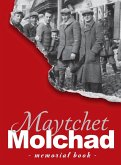This is the story of the fight of young Jewish people from the town of Slonim (Belarus) and its environs, against the German murderers of World War Two and their Belarussian and Polish collaborators. The book lays blame at the feet of Soviet partisans, who abandoned their comrades in arms and incited anti-semitic hatred towards the Jewish fighters. The Jewish group of the Shchors battalion, on the banks of the River Shchara, marched along its battle paths, fought with courage and strength and distinguished itself in battle. They buried their dead, cared for their wounded, and never abandoned their old people and children. Throughout this cruel war in the forests and forest edges they attacked police stations and military camps and blew up trains carrying German troops and equipment. At the end of the war, people from Slonim and the area were recruited into the Red Army and advanced with the Soviet army into German territory. The soldiers who then remained immigrated to Israel and set up their homes there. The writer Sarah Shner-Nishmit, one of the founders of Kibbutz Lohamei HaGetaot (Fighters of the Ghetto), was born in 1913 in the town of Siena, in the Suvalki district, Poland. In 1925 her family uprooted to Lithuania. She completed her studies in Classical Languages and Philosophy at the University of Kovno, Vilna, and in 1962 she completed a post-graduate degree in Archival Studies at the Hebrew University of Jerusalem. She was imprisoned with the invasion of the Soviet union by the German army in 1941, and fled from a German labour camp to the partisans in the forests. She was a nurse in the Soviet partisan troop until the liberation in 1944; from 1945 to 1947 she was one of the founders of the "Zionist Organisation for the Return of Jewish Children" from convents and Christian houses in Poland. From 1955 she was among the workers of the museum of Lochamei HaGetaot alongside her husband Tzvi Shner (director of the museum from 1950 to 1984). She published books and articles about the struggles of the Jews in the ghettoes and the forests.
Bitte wählen Sie Ihr Anliegen aus.
Rechnungen
Retourenschein anfordern
Bestellstatus
Storno









